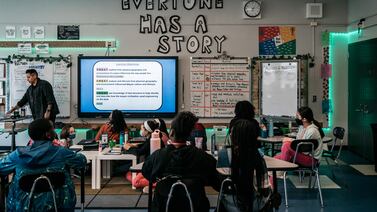Michigan school districts would receive funding increases of between $366 and $550 per student, school breakfasts would be free for all, at-risk students would receive record funding, and the state would help cover some school transportation costs.
Those are some of the school funding proposals currently making their way through the Democratic-controlled Michigan Legislature.
The Michigan House on Wednesday approved a spending plan for public schools that would increase the per-pupil foundation amount to $9,516. That’s up 4% from the current amount of $9,150. The vote was 56-52, along party lines.
The Michigan Senate version of the school aid budget, likely to get a vote Thursday, would increase the per-pupil foundation amount to $9,700.
In the House, Democrats lauded its version of the budget, with some calling it “transformational.”
“This budget proposal does amazing things for every student in our state,” said Rep. Matt Koleszar, a Democrat from Plymouth who leads the House Education Committee.
Once both chambers have approved their respective budgets, a conference committee will iron out the differences, which are wide in some cases.
For example, they are far apart on how much to increase spending for students who are considered at risk. Students are identified as at risk based on a number of factors, including if they come from low-income families, are English language learners, are chronically absent, or are a victim of child abuse or neglect.
Currently, a district’s per-pupil amount is increased by 11.5% for each at-risk student.
Under the Senate plan, schools would continue to receive the additional 11.5%, but for those with the largest concentrations of children from low-income homes, the added payment would be as much as 15.3%.
The House proposal would give districts an increase of 35% for at-risk students.
Rep. Regina Weiss, a Democrat from Oak Park, said the House proposal would be the most the state has invested in the state’s neediest students.
Republican Rep. Brad Paquette, from Niles, voted no on the spending plan. He said that while there are some positive spending proposals, such as the foundation amount and increased spending on mental health, he is concerned about the increased spending on at-risk students, among other issues.
“The increase in at risk sounds like a noble increase. Ultimately these dollars become a slush fund for districts, where dollars do not track with the actual student that is in need,” Paquette said. “How can we ensure that these dollars actually follow those students who are deemed at risk?”
Paquette spoke against several other provisions of the budget, but he was cut off by the House member who was presiding over the chamber at the time while detailing his concerns over funding implicit-bias training after being told he was veering too far off the topic of the budget.
Democrats praised a proposal that would have the state spend $160 million to reimburse school districts for the cost of providing free breakfasts and lunches to all students. During the first two years of the pandemic, federal funding helped pay for free meals, but that funding ended.
“No one deserves to go hungry while they are attending school,” Koleszar said. “Students should focus on what they’re learning, not worry about where their next meal will come from.”
The Senate plan also allocates $160 million for meals.
The budget proposals also include $300 million for Gov. Gretchen Whitmer’s MI Kids Back on Track program, which is aimed at helping students recover academically after pandemic-era declines in achievement; $94.4 million for the Detroit Public Schools Community District for the settlement of a literacy lawsuit; and $75 million to expand the Great Start Readiness Program, Michigan’s free preschool program for 4-year-olds.
Some other features of the budget proposals:
- The House proposal includes $150 million in new funding for school transportation.
- The House would keep funding for Michigan’s online charter schools to current per-pupil levels, while the Senate would cut their funding to $7,760 per pupil.
- The House proposal includes one-time funding of $300 million over two years to provide public schools with per-pupil grants to improve mental health. The Senate plan includes $310 million for public schools and $17.5 million for private schools.
Lori Higgins is the bureau chief of Chalkbeat Detroit. You can reach her at lhiggins@chalkbeat.org.






